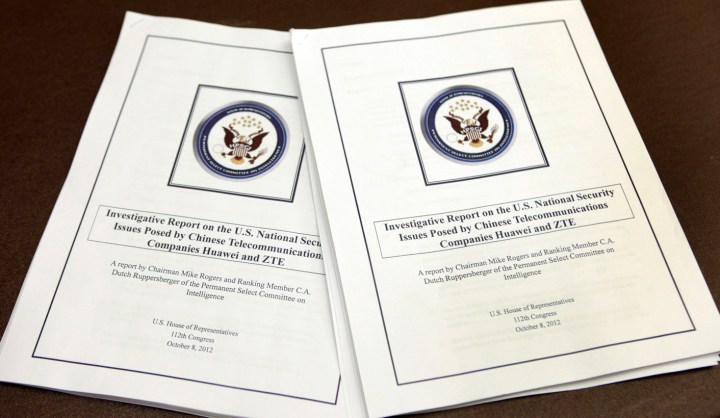World
Chinese security threat or US insecurity? Congress attacks Huawei

According to a US congressional panel, Chinese telecoms giants Huawei and ZTE pose a security threat to the United States. Is this a legitimate response to a potential cyber war, or the desperate complaint of an empire on the wane? After all, while these companies may have a less-than-salubrious history, they did make Africa’s mobile revolution possible. By KEVIN BLOOM.
On Sunday night, 7 October, American news network CBS aired a segment that asked whether the United States, which has largely left its telecommunications business to foreigners, could trust the Chinese to build and maintain the critical data infrastructure that its government and industries rely on. The question that drove the segment was this: if we allow the Chinese to go ahead, will they spy on us?
Seen from outside the US, the levels of paranoia that CBS assumed of its audience could only be construed as ironic. After all, since 9/11, US intelligence agencies have routinely spied on US citizens via the handy access provided by local telcos, and those blatant invasions never had anything to do with the Chinese. Meaning there was perhaps another issue at play in the CBS segment, one where external security threats were somewhat conflated with the internal insecurities of an empire on the wane.
“If you’re concerned about the decline of American economic power and the rise of China, then there is no better case study than Huawei,” correspondent Steve Kroft said in the show’s opening seconds. “Chances are you’ve never heard of this Chinese technology giant, but in the space of 25 years it’s become the largest manufacturer of telecommunications equipment in the world; everything from smart phones to switchers and routers that form the backbone of the global communications network. It’s an industry the US invented and once dominated, but no more.”
In Africa, of course, we have heard of Huawei. The $32-billion multinational, with 140,000 employees and customers in 140 countries, can thank this continent for delivering a significant portion of the business that allowed it to replace Sweden’s Ericsson—in August, 2012—as the world’s foremost provider of telecoms equipment. Amongst the latest African contracts won by the Chinese giant have been a US$71-million national fiber-optic infrastructure and e-governance project in Kenya, and a $200-million network upgrade deal with NetOne of Zimbabwe.
Granted, as Western media were quick to point out, those deals came on the back of Huawei’s conviction, alongside fellow Chinese telecoms behemoth ZTE, on corruption charges in an Algerian court. In June this year, the court found two ZTE employees and a Huawei staffer guilty of paying $US10 million in bribes to a former executive of state-owned Algeria Telecom, and banned both telcos from tendering on public contracts for two years. For their part, the Chinese companies denied participation in the scandal, pleading that they were the unwitting victims of a fraud perpetrated by errant employees.
Whether that was true or not, Australia, for one, would have felt vindicated by the conviction. In April, they had likewise banned Huawei from a public project—not because of a corruption charge, but owing to concerns of cyber attacks emanating from China. It was a bold move by the Australian government, because as expected, it drew the ire of the People’s Republic, with the Chinese foreign ministry and commerce ministry each issuing condemnations of the ban.
And so we come to the United States, where on Monday 8 October, a Congress committee was set to call for investigations against Huawei for alleged bribery and violations of US immigration laws. Further, on Monday night, some hours after this writing, a report of the House intelligence committee was to be released arguing that Huawei and ZTE failed to explain adequately either their US business interests or their relationship with the Chinese government.
“Based on available classified and unclassified information, Huawei and ZTE cannot be trusted to be free of foreign state influence and thus pose a security threat to the United States and to our systems,” noted a draft of the report made available to world media by the committee’s chairman, Republican Mike Rogers.
It was the CBS news segment, however, broadcast on the acclaimed 60 Minutes, that gave the most incisive take on Huawei’s dealings in the United States. Noting that the company intends to build America’s next generation of digital networks, correspondent Kroft acknowledged that Huawei is ostensibly a private conglomerate owned by its employees. Nevertheless, he added, the company’s inner workings as well as its corporate governance records are closely guarded secrets.
Chairman Rogers was interviewed for the programme, as was the ranking Democrat on the House intelligence committee Dutch Ruppersberger, and both voiced their concerns that the Chinese government could exploit Huawei’s presence to gather intelligence and wage cyber war. Another interviewee was former State Department official Jim Lewis, who, when asked how Huawei got so big so quickly, answered as follows:
“First, steady, extensive support from the Chinese government. If you’re willing to funnel hundreds of millions, maybe even billions of dollars to a company, they’re going to be able to grow. The second reason is industrial espionage. And Huawei was famous in their developing years for taking other people’s technology.”
Lewis’s references in the latter instance, as Kroft pointed out, were to Cisco Systems—which in February 2003 sued Huawei for allegedly infringing on its patents and illegally copying source code used in its routers—and Motorola—which in 2010 alleged that Huawei recruited its employees to steal company secrets. Both cases were settled out of court. But it was Lewis’s former assertion, unexplained by Kroft, that was perhaps the more controversial.
In May this year, it was reported that the European Union was set to launch a major trade case against Huawei and ZTE, arguing that the companies had obtained illegal subsidies from the Chinese government and were dumping products on the market below cost. Shortly thereafter, Sweden voiced fears that China would retaliate if punitive tariffs were imposed, thereby triggering a trade war that would do untold damage to Ericsson. In fact, Swedish trade minister Ewa Bjorling went as far as to go on record with this:
“While Chinese companies’ share of the EU’s wireless equipment market is 30%, one has to remember that the EU’s share of China’s wireless equipment market is 45%. So if China were to hit back with similar measures, it would hurt us more than it would hurt them.”
In any event, Brussels stalled the case in mid-September, so as to defuse a row with Beijing on the eve of premier Wen Jiabao’s last summit with European leaders. Karel De Gucht, the EU trade commissioner, conveniently told officials that the case required stronger evidence before it could proceed.
Will the United States have the courage to follow through on its sabre-rattling against a more assertive China? Only time will tell. But if it does, it will be depriving itself of something that was once celebrated as a founding principle of its own empire: the competitiveness of the free market. As the African mobile story has shown, irrespective of the Algerian bribery scandal, the economic benefits of cheap Chinese competition is huge.
Also, there’s the little detail that the Economist magazine brought to light back in August: “Chinese manufacturers and designers have become an integral part of the global telecoms supply chain. Blocking Huawei (or its rival Chinese telecoms giant, ZTE) while allowing gear from, say, Alcatel-Lucent or Ericsson on a network, may make politicians feel good. But it is no guarantee of security. Huawei’s competitors have a vested interest in hyping concerns about it, while disguising their own reliance on Chinese subcontractors and on subsidies.”
Viewed in this context, the US congressional attack on Huawei and ZTE smacks of myopic and ill-disguised protectionism. DM
Read more:
- “Huawei probed for security, espionage risk,” on CBS’s 60 Minutes
- “Who’s afraid of Huawei,” in the Economist
Photo: House Intelligence Committee’s report on “national security threats posed by Chinese telecommunications companies Huawei and ZTE” is seen at a news conference on Capitol Hill in Washington October 8, 2012. U.S. telecommunications operators should not do business with China’s top telecom gear makers because potential Chinese state influence on the companies poses a security threat, the U.S. House of Representatives Intelligence Committee said in a report on Monday. The report follows an 11-month investigation by the committee into Huawei Technologies Co Ltd and ZTE Corp. The companies have been fighting an uphill battle to overcome U.S. lawmakers’ suspicions and expand in the United States after becoming key players in the worldwide market. REUTERS/Yuri Gripas


















 Become an Insider
Become an Insider